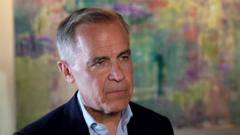Top executives from leading US firms are warning that escalating tariffs are contributing to economic uncertainty, prompting several companies to adjust their profit forecasts. Concerns over price increases and potential recessions are at the forefront of the discussions as trade negotiations continue.
Corporate Leaders Raise Alarm Over Trade Tariffs and Profitability

Corporate Leaders Raise Alarm Over Trade Tariffs and Profitability
Executives from major American companies, including Intel and Procter & Gamble, express concern about the negative impacts of tariffs on their operations and economic stability.
High-profile executives across prominent US corporations are sounding the alarm over the growing influence of tariffs on their businesses and the potential ramifications for the American economy. Notable firms such as technology titan Intel, footwear manufacturer Skechers, and consumer goods powerhouse Procter & Gamble have either re-evaluated or completely withdrawn their profit forecasts due to the uncertainties in the marketplace.
President Donald Trump has implemented substantial tariffs on multiple countries in efforts to amend trade imbalances, yet no fresh agreements have yet materialized from ongoing negotiations, although advancements appear to be taking place with South Korea.
During a recent investor call, Intel's Chief Financial Officer, David Zinsner, stated, “The current state of trade policy, along with regulatory challenges, heightens the risk of an economic downturn, with recession becoming an increasing possibility.” He further noted that the financial outlook for the California-based firm was bleak, resulting in a stock drop of over 5% during extended trading hours.
Similarly, Skechers, which relies heavily on Asian manufacturing—especially in China—reported disappointing forecasts, leading to a drop in investor confidence. The company's Chief Operating Officer, David Weinberg, admitted that the current market conditions were too volatile for accurate forecasting.
Procter & Gamble, the maker of household staples like Gillette and Head & Shoulders, indicated that tariffs could lead to increased consumer costs. Financial Chief Andre Schulten remarked that the company would explore options to offset higher costs from materials sourced from abroad, suggesting possible alterations in pricing strategies.
The influence of trade tensions is also being felt globally, with Japanese convenience store chain Seven & I acknowledging that uncertainty around tariffs is complicating their North American operations, which account for a significant portion of their sales. Incoming CEO Stephen Dacus pointed out the difficulties in navigating unpredictable tariff changes.
Meanwhile, South Korean automotive giant Hyundai has formed a task force to address potential issues arising from escalating tariffs, indicating an ongoing commitment to shifting some manufacturing operations to adapt to the changing trade landscape.
Recent discussions between US and South Korean trade representatives signal some optimism, with US Treasury Secretary Scott Bessent mentioning a productive meeting, hinting at future negotiations regarding tariff adjustments.
As the deadline approaches for a temporary pause on certain tariffs, companies worldwide remain apprehensive about the potential for higher operational costs and the overall impact on the economy’s stability.






















